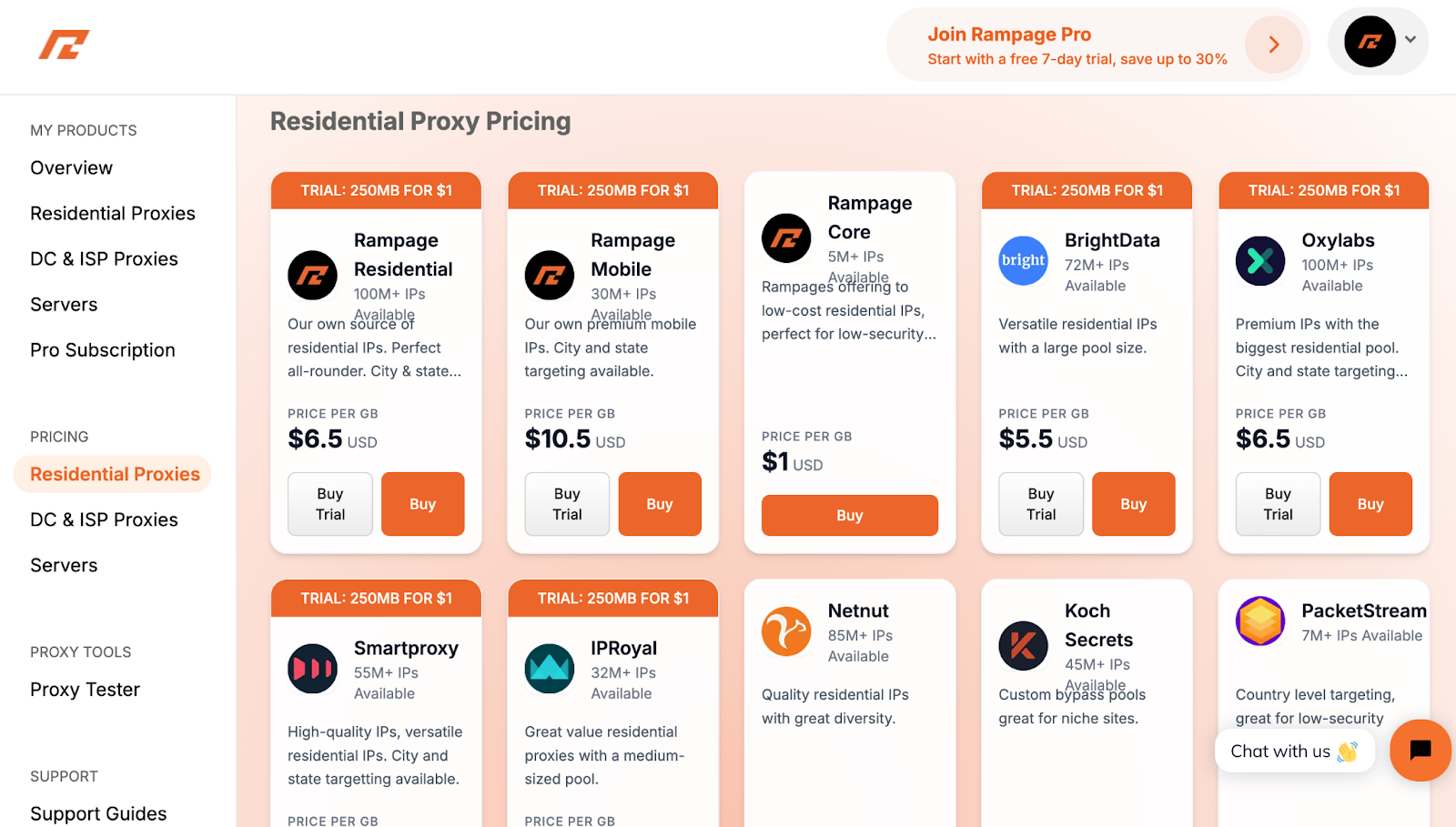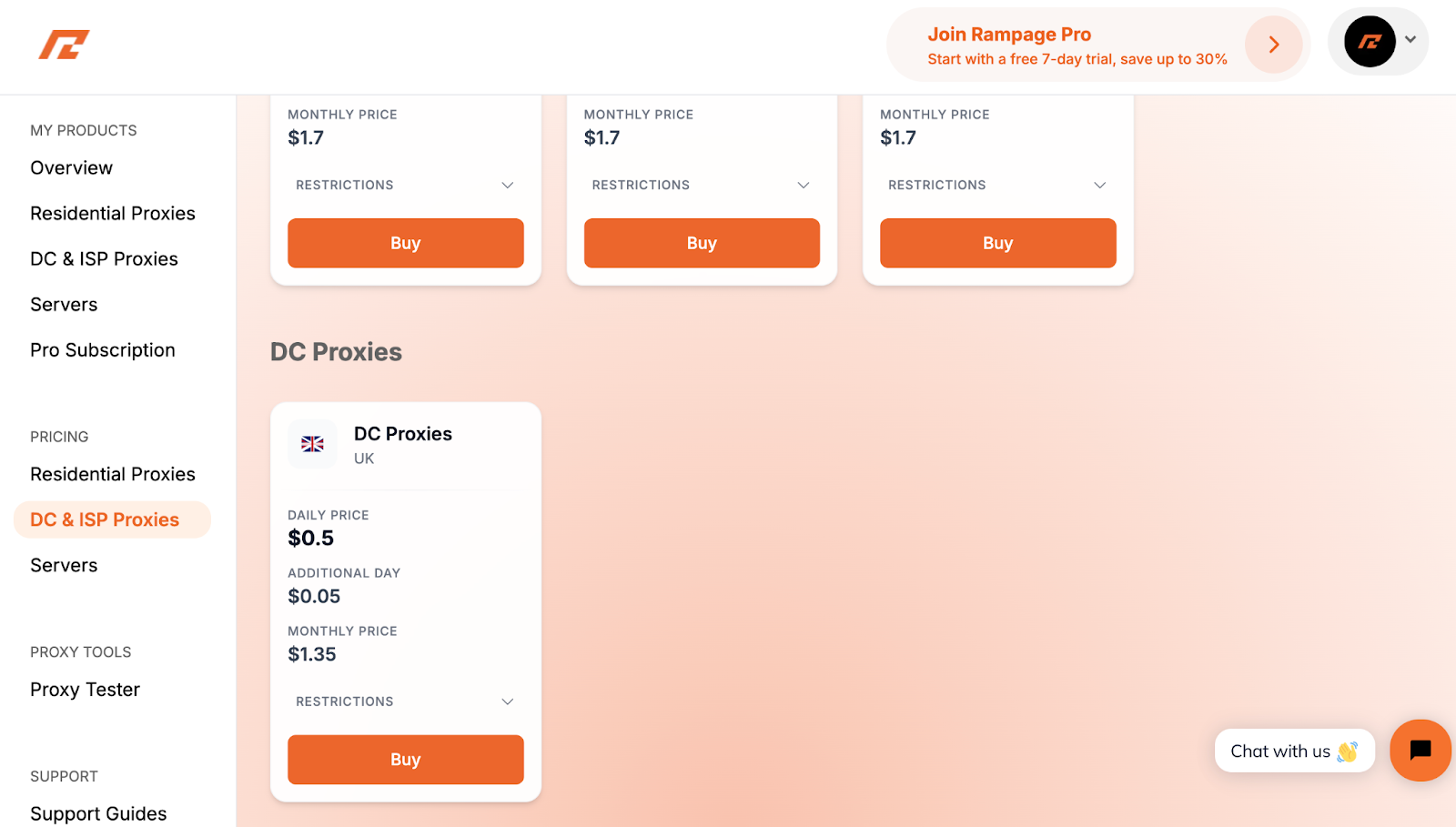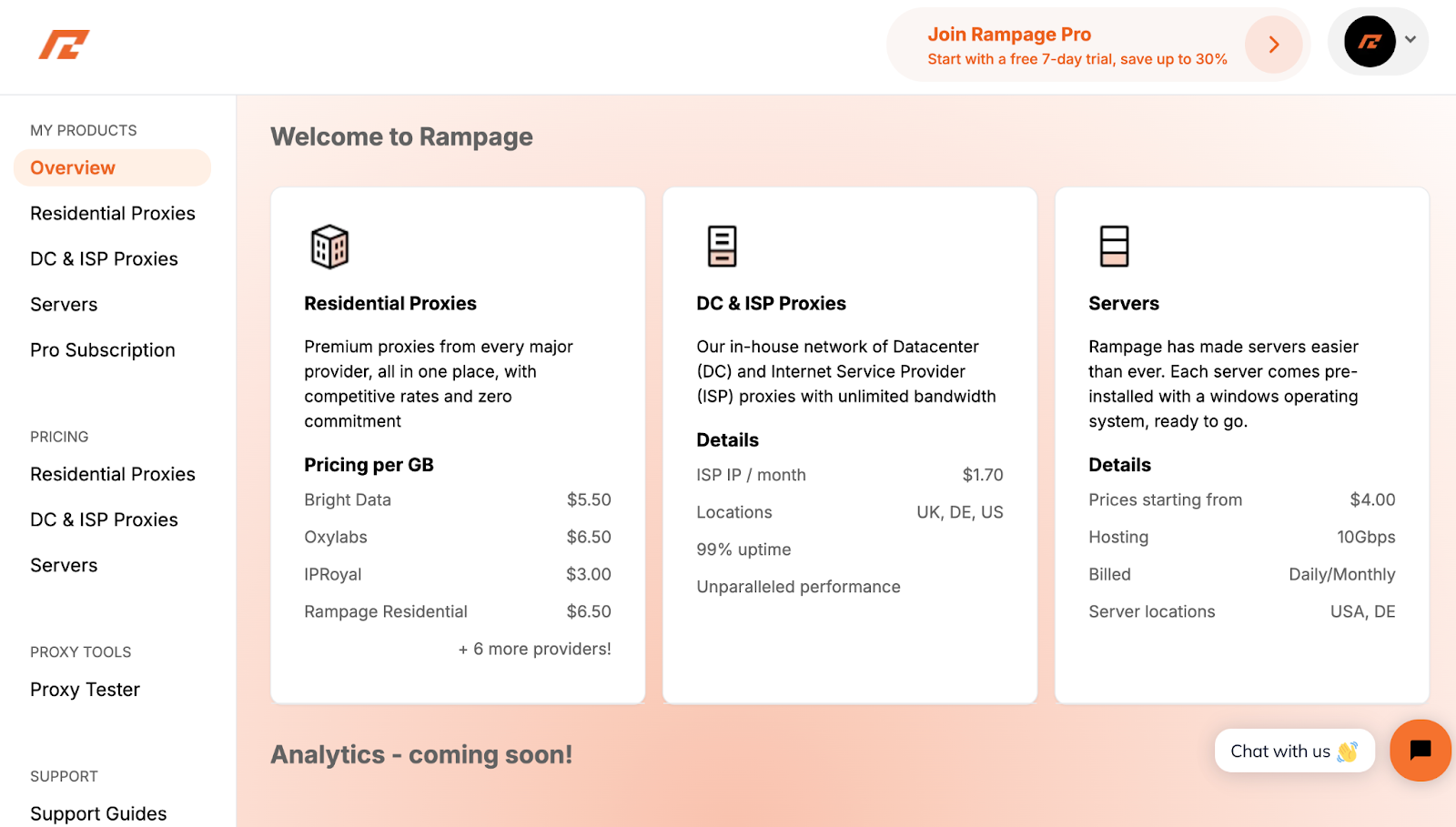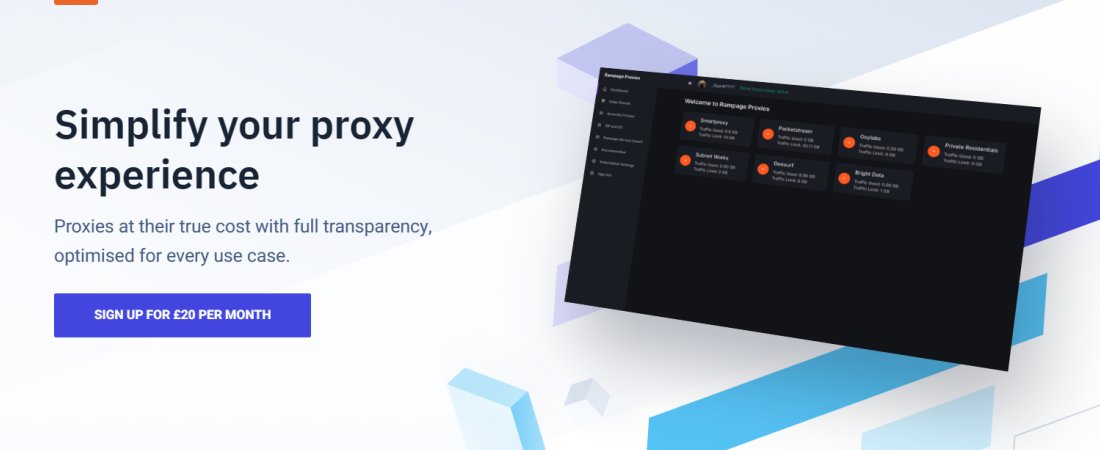TechRadar Verdict
Rampage curates proxies from different providers, offering users discounted plans. It outshines most competitors in residential proxies but is lacking in datacenter and ISP proxies.
Pros
- +
Affordable
- +
Widespread coverage
- +
Intuitive interface
Cons
- -
Limited customer support
- -
No free trial
- -
U.K.-only datacenter proxies
Why you can trust TechRadar
Rampage Proxies was founded in 2018 with a focus on offering affordable proxy services. It differentiates itself from most proxy providers with its wholesale approach. Rather than offering just its proxy network, it resells proxies from other providers wholesale, enabling Rampage to offer competitive pricing.
This platform is transparent about its proxy providers and the quality of their proxy networks. It resells proxies from various providers with a collective pool of 400 million IP addresses, one of the largest we’ve encountered in a proxy network.
We’re reviewing Rampage Proxies to help you decide whether it’s a good choice. Our review covers crucial aspects like pricing, features, customer support, and user-friendliness. Read on as we explore this platform further.
Rampage Retail: Plans and Pricing
Rampage Proxies offers three types of proxies: residential, datacenter, and ISP. Users pay for residential proxies according to bandwidth, but data center and ISP proxies provide unlimited bandwidth for a monthly fee.
Residential proxies cost as low as $1 per GB. Pricing depends on the type, location, and other factors. For instance, mobile residential IPs cost more than PC IPs. City-specific IPs also cost more than randomly located IPs. However, Rampage generally offers affordable residential IPs.
Data center proxies cost $1.35 monthly, and ISP proxies cost $1.7 monthly, with unlimited bandwidth. These proxies are cost-effective, given the unlimited bandwidth allowance.
If you’re a high-volume user needing further discounts, you can purchase a Rampage Pro membership for $25 monthly. This membership provides up to 65% discounts on the usual prices of Rampage’s proxies.
Sign up to the TechRadar Pro newsletter to get all the top news, opinion, features and guidance your business needs to succeed!
Rampage Retail: Features
Rampage offers three main types of proxies: residential, datacenter, and ISP. Let’s explore its features deeper.
Residential proxies
Residential proxies are real IP addresses tied to physical devices. These IP addresses are sourced from device owners around the globe, who agree to add their IP address to the proxy network in exchange for a benefit. For example, many people add their unused bandwidth to a proxy pool in exchange for a VPN subscription. Some people also sell their unused bandwidth on PacketStream, one of the proxy providers Rampage resells from.
Having ethically obtained proxies is important in an industry plagued by illegally sourced, unreliable IPs. Rampage gives you access to reliable residential IPs obtained with their owners’ consent. It has a collective pool of 400 million+ IPs from 7 providers: Bright Data, O Proxy, S Proxy, PacketStream, Koch Secret, and IPRoyal. These IPs cover virtually all countries, enabling users to bypass geo-restrictions seamlessly.
What are residential proxies used for? Data scraping is one example. Suppose you run a price comparison website that shows users the best electronics deals. Operating this website requires constantly scraping pricing data from online retailers like Amazon and Walmart. However, online retailers don’t like data scraping and use IP and geographical restrictions to prevent it. Proxies help you bypass these restrictions and access relevant data.
You can choose a residential proxy and access e-commerce sites like a typical user. For instance, you could be in Singapore and use a German IP to access a local e-tailer and get pricing data. As far as the e-tailer is concerned, the IP address is tied to a legitimate device within Germany’s borders, so it’ll grant you access.

Sometimes, retail websites monitor IPs tied to data scraping bots and swiftly ban them. However, Rampage links you to an endless pool of proxies. If one proxy is detected and banned, just choose another and continue your data scraping.
The amount you’ll pay for proxies depends on the bandwidth you consume and the provider. For example, PacketStream’s proxies cost $1 per GB, while Bright Data’s cost $4.40 per GB. The difference is that PacketStream is a peer-to-peer proxy service where users buy and sell bandwidth directly to each other. This model makes its prices cheaper, but PacketStream’s proxies have no city-level targeting, and the geographical network isn’t as broad as Bright Data’s.
IPRoyal costs $3 per GB, but the optional membership discounts it to $2. Suppose you use 200 GB of bandwidth monthly. A membership reduces your bill from $600 ($3 x 200 GB) to $400 ($2 x 200 GB). A $25 monthly membership saves you $200 in this case. That’s what we like about Rampage.
We also like Rampage Proxies’ widespread proxy coverage. Collectively, it offers access to 400 million+ residential IPs across 195 countries. Unlike some proxy providers, which only let users choose countries, you can select proxies in specific cities and vicinities.
Datacenter Proxies
Datacenter proxies are IP addresses tied to remote servers. The server acts as an intermediary between your device and the internet, routing all your browsing requests to bypass geographical and IP restrictions.
Datacenter proxies are hosted in high-speed data centers with robust internet connections. This gives them faster response times and lower latency than residential proxies sourced from end users' devices with potentially unstable connections. If you need proxies for time-sensitive tasks, datacenter proxies are better than residential proxies.
The drawback is that datacenter proxies are easier to detect than residential proxies. They use a different IP structure than residential proxies, which makes it easier for websites to identify them. On the bright side, Rampage lets you access as many datacenter proxies as you need. If one is detected, spin up another and continue surfing the web with enhanced anonymity and privacy. Each new IP costs $1.35 monthly, and you can spin up as many as possible.
Rampage offers dedicated data center IPs, which give you control over your usage and reduce your chances of getting blocked. You won’t be affected by the actions of other users, unlike when using shared proxies.

Rampage offers in-house datacenter proxies, unlike residential IPs that it sources from external providers. Unfortunately, it offers datacenter IPs in only one location: the U.K. You’ll pay $1.35 monthly per IP with unlimited bandwidth, which is very affordable.
ISP Proxies
ISP proxies are IP addresses sourced directly from Internet Service Providers (ISPs). They blend the authenticity of residential IPs with the speed and stability of datacenter proxies.
Residential proxies are harder for websites to detect because they look like real devices visiting a website. However, there’s a higher chance of getting an unstable connection or encountering low speeds. Datacenter proxies solve this issue with high-speed proxy servers, but they’re easier to detect because of the smaller IP ranges.
Rampage’s ISP proxies solve the problems of residential and datacenter proxies. They are difficult for websites to detect because they’re sourced directly from ISPs and look like real users visiting a website. They’re also hosted on data centers, offering superb speed and uptime.
Rampage users pay for ISP proxies according to bandwidth: $1.7 monthly per IP. The drawback is that ISP proxies are only available in three countries: the U.K., the U.S., and Germany.
During our test, Rampage’s proxies offered excellent speed. However, we encountered some notable drawbacks. Rampage offers a massive residential proxy network, but its datacenter and ISP proxies are limited to just two countries.
If you primarily need datacenter and ISP proxies, Rampage isn’t the best choice because it limits you to the U.K. and Germany. However, if you need residential proxies, Rampage is one of the best choices. It connects you to an unprecedented 400 million+ IPs from different providers, with city-state targeting, reasonable speeds, and global coverage.
We’ve discussed Rampage's features, but it’s important to show what it lacks. For one, Rampage doesn’t provide web scraping APIs like many rivals. Data scraping is a common use case for proxy IPs, so proxy providers offer APIs to let users automate scraping tasks.
You’ll set the target website and desired data, and the API goes to work. The timing depends on the volume of the data, and you can schedule scraping tasks beforehand, e.g., scraping price data daily from a retail site. Unfortunately, you won’t find this feature on Rampage, so you’ll need an external platform to handle it.
Rampage Retail: Ease of Use
User-friendliness is one of the best things about choosing Rampage as your proxy provider. It has an intuitive interface that's simple to navigate. All features are arranged on the left menu, and on the right side lies the main dashboard to access these features. Rampage's interface sports a dark background and white text that makes it easy to find what you want.

From your dashboard, you can buy a proxy from any available provider and monitor your usage. Rampage shows precisely how much bandwidth you've used from each proxy provider and how much is left. Integrating and managing your proxies is as easy as possible.
Rampage Retail: Customer Support
A live chat module provides real-time communication with Rampage’s support staff during working hours. You can also fill out the contact form on the official website and wait for a response within 24 to 48 hours. However, there’s no telephone support option.
We consider Rampage Proxies lacking in self-help support resources. There’s a documentation section for users, but it’s sparse compared to what other proxy providers offer. We think Rampage’s team can do better by writing more detailed technical guides and covering more features.
Rampage Retail: The Competition
It’ll feel odd to highlight some Rampage rivals, given that Rampage resells proxies from some of them. For example, we can consider Bright Data as a formidable rival, but Rampage resells proxies from this rival at a discounted rate. The same applies to PacketStream, a peer-to-peer proxy platform Rampage resells from.
But there’s a catch. Rampage primarily resells residential proxies and doesn’t focus on datacenter proxies. Bright Data provides access to a large network of datacenter proxies: 770,000 IPs across the U.S., the U.K., Germany, Italy, France, Canada, and many other countries. Compare that to Rampage, which only offers U.K.-based datacenter proxies. Bright Data is clearly better than Rampage Proxies in this category.
Oxylabs is another formidable rival offering shared and dedicated datacenter proxies in eight countries: the U.S., Netherlands, Germany, U.K., Romania, France, Belgium, and Japan. Though Oxylabs’ datacenter proxy pool is significantly smaller than Bright Data’s, it’s better than Rampage that only offers datacenter proxies from the U.K.
PacketStream only offers residential proxies, so there’s not much separating it from Rampage. In summary, Rampage Proxies offers the broadest residential proxy pool we’ve encountered, but many rivals are superior in datacenter and ISP proxies.
Rampage Retail: Final verdict
Rampage Proxies is an excellent choice for residential proxies. In addition to its in-house proxies, it resells proxies from various third-party providers, assembling one of the largest IP pools we’ve encountered. Its proxies are also discounted after paying a membership fee, enabling bulk users to save considerable money.
However, Rampage falters when it comes to datacenter and ISP proxies. It offers datacenter proxies in only the U.K. and ISP proxies in only the U.K., the U.S., and Germany, unlike some rivals with broad datacenter and ISP proxy pools.
We've rated the best business VPNs.
Stefan has always been a lover of tech. He graduated with an MSc in geological engineering but soon discovered he had a knack for writing instead. So he decided to combine his newfound and life-long passions to become a technology writer. As a freelance content writer, Stefan can break down complex technological topics, making them easily digestible for the lay audience.

